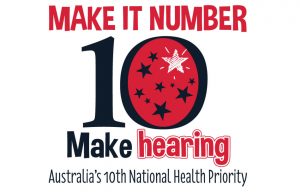
A lack of formal training for carers has created a hidden crisis in hearing health in Australia’s aged care system.
According to the Deafness Forum of Australia, despite the high proportion of aged people requiring hearing care, their needs have been grossly ignored.
“It is a national disgrace that while more than seven out of ten older Australians suffer from hearing loss, the staff entering the aged care system are seldom trained to assist them,” said David Brady, chairman of the national advocacy body.
For many years, hearing assistance has been given minimal attention in pre-service training for both community in-home and residential carers. Staff with limited knowledge may not sufficiently recognise hearing assistance needs when drawing up personal care plans that describe the scope of care that will be provided to a person.
Deafness Forum said the result is wide-spread under-recognition and under-management of hearing loss in both community and residential aged care settings.
“Carers are hard-working and highly valued by the community, but how can we expect them to do their jobs if they don’t receive the necessary training?” David Brady said.
Even a mild hearing loss can create difficulties in conversation, leading to social isolation and serious anxiety. If it is ignored, hearing loss may also increase depression and dementia.
The Community Services and Health Industry Skills Council determines the training given to future aged care staff in TAFE and private colleges across Australia. The Skills Council is currently reviewing these training requirements but has resisted calls to include adequate instruction in hearing assistance in the relevant Direct Client Care Training Package.
“After years of this neglect the standard of hearing assistance must be improved as rapidly as possible,” Mr Brady said.
Deafness Forum wants an elective unit for students which allows for deeper study of hearing assistance. Over time, this would create a cadre of staff who can help lift the quality of hearing assistance in aged care.
Hearing assistance includes:
- techniques to use when communicating with a hearing impaired or Deaf person
- knowledge of hearing aids and assistive listening devices, and other communication technologies
- management and basic trouble shooting of hearing aids, assistive listening devices and cochlear implants.
More than 3.5 million Australians are expected to use aged care services each year by 2050.
“This makes the demand for a solution, not just someone else’s problem, but very personal for every member of the community.”
“We cannot and will not walk away from our responsibility to this very large group of people,” David Brady said.
Deafness Forum of Australia is the national representative of all Australians who have a hearing impairment, a chronic disorder of the ear, are Deaf or deafblind, and the families who support them.
It recently launched its public campaign to make Hearing the 10th National Health Priority in Australia.
Contact
Steve Williamson, chief executive, Deafness Forum: 02 6262 7808, 04523 88069
steve.williamson@deafnessforum.org.au



